
Maxwell Lemuel Roach was an American jazz drummer and composer. A pioneer of bebop, he worked in many other styles of music, and is generally considered one of the most important drummers in history. He worked with many famous jazz musicians, including Clifford Brown, Coleman Hawkins, Dizzy Gillespie, Charlie Parker, Miles Davis, Duke Ellington, Thelonious Monk, Abbey Lincoln, Dinah Washington, Charles Mingus, Billy Eckstine, Stan Getz, Sonny Rollins, Eric Dolphy, and Booker Little. He also played with his daughter Maxine Roach, a Grammy nominated violist. He was inducted into the DownBeat Hall of Fame in 1980 and the Modern Drummer Hall of Fame in 1992.

Clifford Benjamin Brown was an American jazz trumpeter, pianist and composer. He died at the age of 25 in a car crash, leaving behind four years' worth of recordings. His compositions "Sandu", "Joy Spring", and "Daahoud" have become jazz standards. Brown won the DownBeat magazine Critics' Poll for New Star of the Year in 1954; he was inducted into the DownBeat Hall of Fame in 1972.

McKinley Howard "Kenny" Dorham was an American jazz trumpeter, composer, and occasional singer. Dorham's talent is frequently lauded by critics and other musicians, but he never received the kind of attention or public recognition from the jazz establishment that many of his peers did. For this reason, writer Gary Giddins said that Dorham's name has become "virtually synonymous with 'underrated'."
Raymond Allen Draper was an American jazz tuba player.
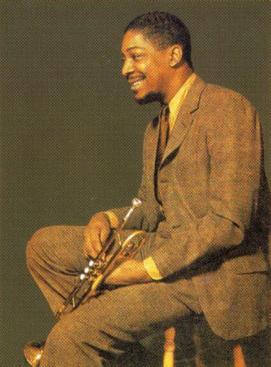
Booker Little Jr. was an American jazz trumpeter and composer. He appeared on many recordings in his short career, both as a sideman and as a leader. Little performed with Max Roach, John Coltrane, and Eric Dolphy and was strongly influenced by Sonny Rollins and Clifford Brown. He died aged 23.

Richard Powell was an American jazz pianist, composer, and arranger. He was not assisted in his musical development by Bud, his older and better known brother, but both played predominantly in the bebop style.

Saxophone Colossus is the sixth studio album by American jazz saxophonist Sonny Rollins. Perhaps Rollins's best-known album, it is often considered his breakthrough record. It was recorded monophonically on June 22, 1956, with producer Bob Weinstock and engineer Rudy Van Gelder at the latter's studio in Hackensack, New Jersey. Rollins led a quartet on the album that included pianist Tommy Flanagan, bassist Doug Watkins, and drummer Max Roach. Rollins was a member of the Clifford Brown/Max Roach Quintet at the time of the recording, and the recording took place four days before his bandmates Brown and Richie Powell died in a car accident on the way to a band engagement in Chicago. Roach appeared on several more of Rollins' solo albums, up to the 1958 Freedom Suite album.

Curtis Counce was an American hard bop and West Coast jazz double bassist.

Study in Brown is a Clifford Brown and Max Roach album. The album consists predominantly of originals by members of the band. The songs "Lands End", by tenor saxophonist Harold Land, and "Sandu", by Brown, have gone on to become jazz standards. The song "George's Dilemma" is also known as "Ulcer Department". Brown's solo on "Cherokee" is among the most acclaimed solos in jazz.

Max Roach + 4 is an LP recorded by jazz drummer Max Roach, which featured Kenny Dorham on trumpet, Sonny Rollins on tenor sax, Ray Bryant on piano, and George Morrow on bass. It was the first album Roach recorded after his collaborators, trumpeter Clifford Brown and pianist Richie Powell, died in a car crash in June 1956.

Tenor Madness is an album by jazz musician Sonny Rollins released in October 1956 by Prestige Records. It is most notable for its title track, the only known recording featuring both Rollins and John Coltrane.
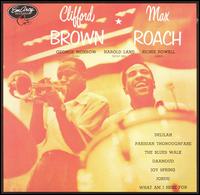
Clifford Brown & Max Roach is a 1954 album by influential jazz musicians Clifford Brown and Max Roach as part of the Clifford Brown and Max Roach Quintet, described by The New York Times as "perhaps the definitive bop group until Mr. Brown's fatal automobile accident in 1956". The album was critically well received and includes several notable tracks, including two that have since become jazz standards. The album was inducted into the Grammy Hall of Fame in 1999. It is included in Jazz: A Critic's Guide to the 100 Most Important Recordings, where it is described by New York Times jazz critic Ben Ratliff as "one of the strongest studio albums up to that time".

Clifford Brown and Max Roach at Basin Street is a 1956 album by the Clifford Brown and Max Roach Quintet, the last album the quintet officially recorded. Apart from Sonny Rollins Plus 4, it was the last studio album Brown and pianist Richie Powell recorded before their deaths in June that year. The title is a reference to the Basin Street East jazz club, where the quintet had performed several times.
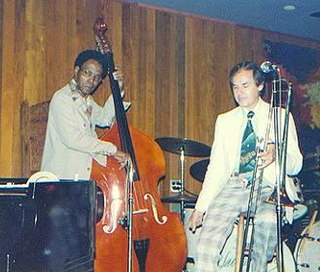
George Morrow was a jazz bassist. Although most closely associated with Max Roach and Clifford Brown, Morrow also appears on recordings by Sonny Rollins and Sonny Stitt.

This article presents the discography of the jazz saxophonist and band leader Sonny Rollins.

Jazz in ¾ Time is an album by American jazz drummer Max Roach featuring tracks recorded in late 1956 and early 1957 and released on the EmArcy label.
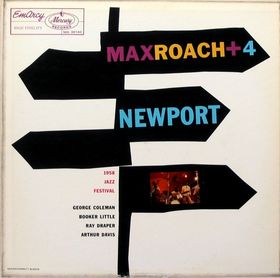
Max Roach + 4 at Newport is a live album by American jazz drummer Max Roach recorded at the Newport Jazz Festival in 1958 and released on the EmArcy label.
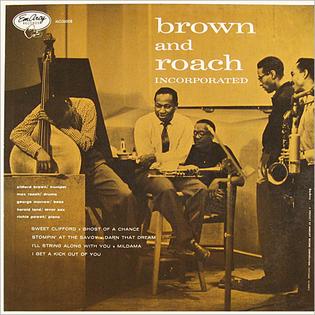
Brown and Roach Incorporated is an album by American jazz trumpeter Clifford Brown and drummer Max Roach featuring tracks recorded in August 1954 and released on the EmArcy label.
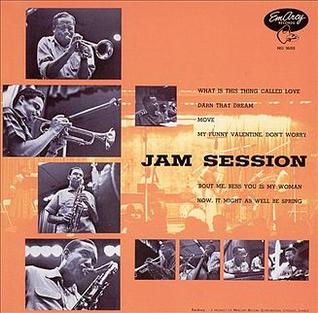
Jam Session is a live album by trumpeters Clifford Brown, Clark Terry, and Maynard Ferguson featuring tracks recorded in early 1954 and released on the EmArcy label. The album was recorded at the same session that produced Dinah Washington's Dinah Jams.

Alone Together: The Best of the Mercury Years is a compilation album featuring recordings by trumpeter Clifford Brown and drummer Max Roach in groups together and separately which were originally released on Mercury and subsidiary labels.



















